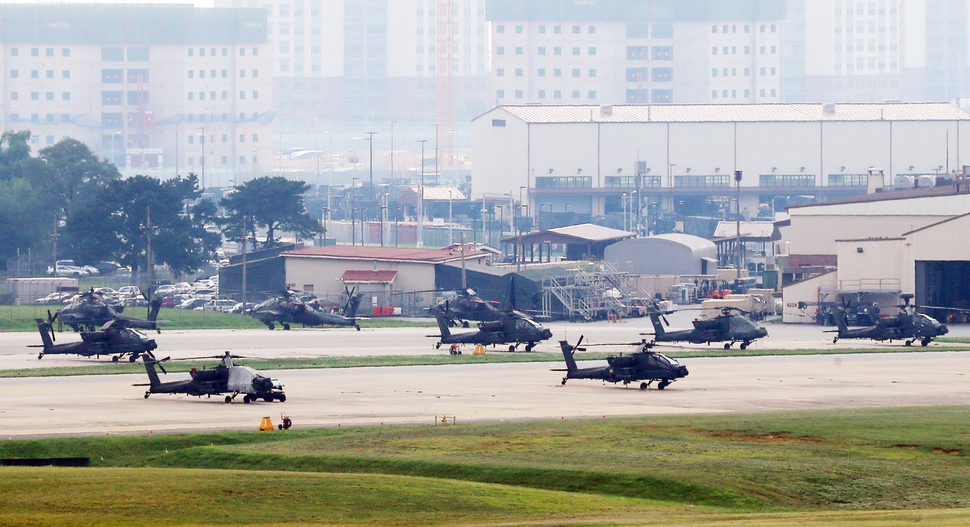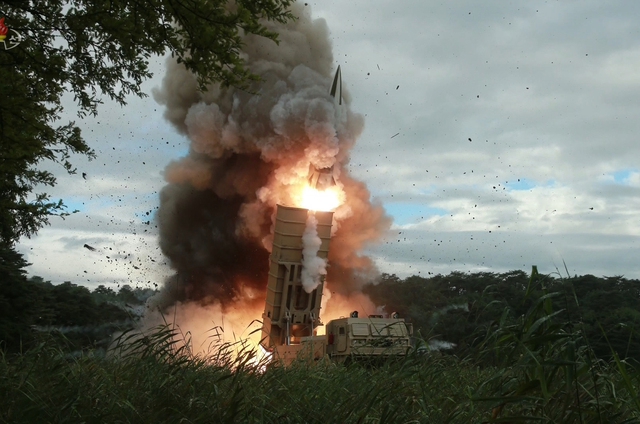 |
|
Helicopters stationed at the US Army's Camp Humphreys in Pyeongtaek, Geonggi province.
|
Self-fulfilling prophecy of security paranoia only increases tension
Aug. 20 marked the final day of the South Korea-US joint military exercise that North Korea criticized as a “dangerous prank, a rehearsal for an invasion through a preemptive attack on North Korea” on page six of the Aug. 20 edition of the state-run Rodong Sinmun newspaper. Many experts are hopeful that the long-delayed North Korea-US working-level negotiations will now resume, thereby breathing new life into the choked inter-Korean relationship. But even if North Korea and the US resume working-level talks, numerous obstacles remain before inter-Korean relations can get back on track, the greatest of which is the abysmal lack of inter-Korean trust. The return of the distinctly North Korean style of invective — which had disappeared after the inter-Korean summit at Panmunjom on Apr. 27, 2018 — is an “indication of crisis,” according to a senior official in the area of foreign policy and security. This invective was on full display in the Aug. 16 statement by the spokesperson of North Korea’s Committee for the Peaceful Reunification of the Fatherland, which bashed South Korean President Mon Jae-in’s commemorative address on Liberation Day, on Aug. 15, as being fit to make “the boiled head of a cow provoke a side-splitting laughter.” The statement used vulgar language in an all-out assault on Moon, calling him “an impudent guy rare to be found” and a “is so funny man” who “get shocked into fright even at the sound of a sporting gun in the north..” This is a reversion to North Korea’s nasty habits that date back to the period of hostility in the Cold War. It’s also a complete betrayal of the vow to “always move forward while holding hands [with Moon] as we are right now” that North Korean leader Kim Jong-un, revered in North Korea as “our beloved supreme leader,” made during the press conference for the Pyongyang summit on Sept. 19, 2018, as well as the appeal to achieve a “global level of advancement” in all areas that he made during his address to North Korea’s Supreme People’s Assembly on Apr. 12. The diagnosis offered by one senior official is that “Kim’s subordinates appear to have detected his dissatisfaction and irritation and are competing to come up with the best insults.” North Korea’s persistent use of invective in its statements is worrisome not only because it distracts from the actual argument being made but also, in the words of a senior government official, “it can make losers out of everyone.” Another problem is North Korea’s disparagement of the role that South Korea has played in the Korean Peninsula Peace Process. When Kwon Jong-gun, director general of the American Affairs Department at North Korea’s Foreign Ministry, said in a statement on June 27, “Though we are to enter into a dialogue in future as the currents flow in favor of dialogue, they had better keep in mind that this dialogue would be held strictly between the DPRK and the U.S., not between the north and the south.” His comments seemed to reaffirm North Korea’s traditional point of view. But the fact is that North Korea has always changed its tune depending on whether or not it’s pleased with how things are going. Kwon’s statement directly contradicted a front-page story on the May 27, 2018, issue of the Rodong Sinmun, which reported that Kim had “expressed his gratitude for the effort that President Moon Jae-in had made on behalf of the North Korea-US summit, which is scheduled for June 12” during the inter-Korean summit at Unification House, in Panmunjom, on May 26, 2018. North Korea’s behavior is rooted in its frustration and dissatisfaction with the lack of progress in its negotiations with the US and in the fact that inter-Korean cooperation is blocked by sanctions. In relation to current affairs, this represents both a propaganda campaign to mollify internal discontent and a backlash to the South Korea-US joint military exercise and South Korea’s acquisition of cutting-edge weaponry (such as the F-35A fighter and the Global Hawk spy plane), both through “words” (the invective-laden statements) and “deeds” (launching missiles and rockets).
 |
|
North Korea's Korean Central News Agency (KCNA) reported on Aug. 17 that the "short range projectiles" fired by North Korea on the morning of Aug. 16 were "new weapons," and that Chairman Kim Jong-un "instructed another test launch" of this new weapon.
|







